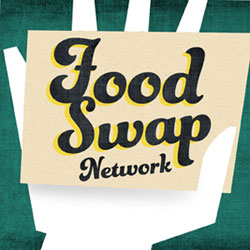The food swapping movement is taking off in the UK with new groups springing up across the country. Throughout history food has been swapped and traded, from cacao beans to spices. But a modern movement is growing in the UK with anything from home-made sushi, ice cream and pate to eggs, apples and wild garlic on offer.
The swaps are organised events where people trade home-grown, home-made or foraged foods with each other. No money changes hands, food is the only currency. The Food Swap Network started in Brooklyn, New York, and so far 125 groups have been established across the US and Canada, from Honolulu to Boston. They are now spreading to Europe, with the UK leading the way.
www.bbc.co.uk/
Food Swap Network is a not-for-profit collective dedicated to promoting food swapping and collective food sharing across the world. It costs us about $12 per month to run this site.
This is a project we took on because we love connecting fellow food community members. (Learn more about us here.) We’re not looking to earn money beyond paying for out-of-pocket expenses and continuing to make Food Swap Network a functional resource for food swappers.
Here are the top three things to keep in mind before your first swap
1. What to bring: Bring as few or as many items as you want. You can bring many of the same item or shake it up and bring all sorts of different items. Visit the FAQs page for info on what kinds of things people bring.
2. Packaging: Keep in mind that swappers will be examining and picking up your goods, so be sure to package them in a way that protects the food and makes it clear the amounts you want to swap. We encourage reusable, earth-friendly packaging whenever possible. Don’t feel like you need to spend a lot of time decorating or composing fancy packaging unless you like to do it, that is.
3. At the swap: Don’t get your feelings hurt if someone says no thanks to your swap item. Food is a very personal matter and a number of factors – like food allergies, personal preference, utility of the item in their kitchen – will influence someone’s decision to swap.
Likewise, don’t be afraid to say no to someone. You wouldn’t buy something at the grocery store you’re not going to eat, so swapping because you don’t want to hurt a fellow swapper’s feelings isn’t expected of you at a swap. Sure, you can always swap and give away the item, but only if you have extra items to work with, which will not be the case for people who only bring a few items.




